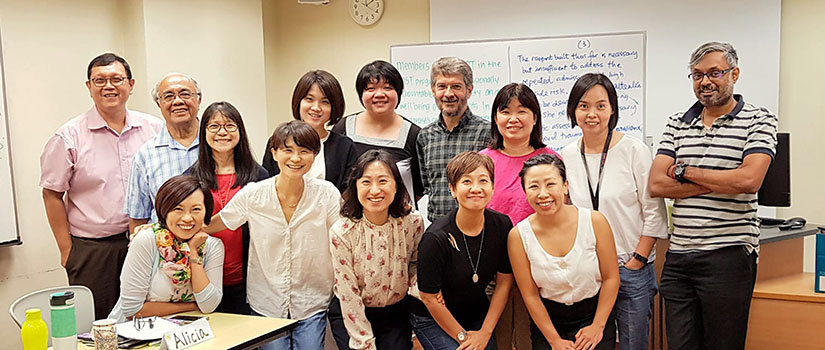Nov. 6, 2019
Chris Woodley • cwoodley@mailbox.sc.edu
The Case Method of teaching provides students with real-world situations that pose a problem or dilemma. Students serve as decision makers by analyzing data and considering theories to draw conclusions and present solutions. College of Social Work Professor Terry Wolfer has written and presented extensively on the advantages of case method teaching. And thanks to the Fulbright program, he had the opportunity this summer to present this teaching method to social work educators at the National University of Singapore.
Instead of a traditional Fulbright program, which can last a semester, Wolfer participated in the Fulbright Specialist Program. This program sends faculty and professionals from the United States to serve as expert consultants on curriculum, faculty development, institutional planning, and related subjects at academic institutions abroad for two to six weeks.
“I imagined that I would do a Fulbright sometime in my career, so several years ago I wrote an application that was competitively reviewed and accepted. I was placed on a roster to let others know my availability,” Wolfer says.
The opportunity arrived when he was leading a half-day workshop on case method teaching at a conference last fall. One of the attendees was the head of the social work department at the National University in Singapore and asked Wolfer if he could present the same topic to her faculty.
“When we were deciding whether to do the workshop back in February, the head of the department promoted the idea with her faculty,” Wolfer says. “I then Skyped into a faculty meeting and did a one- hour version to introduce the case method and how it works. Based on that call, the faculty requested the workshop.”
Since 2016, Wolfer has hosted the Case Method Teaching Institute, a three-day faculty development workshop providing intensive, experiential learning with actual cases drawn from university classrooms and social work practice. He has also conducted workshops on case method training at universities and national conferences throughout the country.
Wolfer arrived in Singapore in mid-July and trained the entire social work faculty and several adjuncts on case method teaching during a three-day workshop. Subsequently, he conducted a two-day workshop on case writing to assist the faculty in creating Singapore-based cases for their courses. According to Wolfer, the faculty was engaged and eager from the beginning. On the second day of the workshop, he provided brief cases for groups of four or five to plan a discussion and then one group member led the class discussion. Wolfer was impressed by their competency and thoughtful participation.
“I took the case method institute that we conduct here and presented it in a different educational system and cultural setting. Since half of their faculty had been trained in the United States, I used some social work cases from the U.S. because I assumed they knew enough about United States social work to discuss these cases,” Wolfer says. “But my goal was to train their faculty on case method and how to write cases so they could write their own cases for Singapore students that portray Singapore social workers.
“I was gratified to see how excited they were with the sessions,” Wolfer says. “It was a more positive response then I expected. They were sharp enough to pick up on things I was doing that most people don't notice and asked great questions. Even though they had to come back early from summer break, they were thoroughly engaged in the workshop.”
After the trainings were complete, Wolfer stayed in Singapore for a few weeks to interview four social work practitioners and one social work student about dilemmas they had experienced in practice. For each interview, Wolfer partnered with university faculty members to co-author decision cases.
“I interviewed five people for cases and teamed it with various combinations of one or two faculty members on each case,” Wolfer says. “I conducted the interviews and taught the faculty how to write the case. They're drafting the cases, and I'm giving them guidance and extensive feedback, helping them bring the cases to conclusion. We're also co-authoring teaching notes to guide their use of the cases.”
Singapore is only about one-third the size of Richland County, South Carolina, yet the population of 5.6 million is larger than the Palmetto state. When he returned to South Carolina, Wolfer brought back different perspectives from his month-long Fulbright experience.
“It was fun meeting impressive colleagues from another part of the world who are doing great research and teaching,” Wolfer says. “Social work in Singapore is different from here, so it was fascinating to see how they organize society and social services. Interviewing social workers and co-authoring decision cases provided a unique, close-up view of social work practice in Singapore.”
